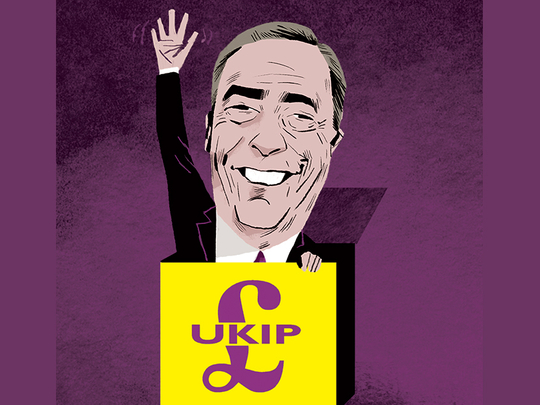
At last, a new leader of the United Kingdom Independence Party (Ukip) is taking over. We have been here before, of course. In October, Diane James resigned from the post, a mere 18 days after her election. The second contest has scarcely been auspicious. A row with a colleague that landed him in hospital for three nights ended the candidacy of Steven Woolfe.
To compound the impression of fragmentation and irrelevance, the race between the surviving contestants — Paul Nuttall, John Rees-Evans and Suzanne Evans — has been completely overshadowed by Nigel Farage’s bid to become American President-elect Donald Trump’s First Friend. All that schmoozing in Mississippi and Trump Tower has simply strengthened the impression that Ukip is a one-man show whose Elvis has now left the building. So farewell then, Kippers? Mission accomplished, the European referendum won, time to draw stumps? Not by a long way, I suspect. For more than three decades it has been orthodox to argue that, if a serious new force emerged in British politics, it would mark a coming together of centre-right and centre-left.
The Social Democratic Party (SDP) was a failed prototype of this hypothetical movement. Now, the dual impact of Brexit and Labour’s shift to the Left has revived speculation about the destiny of those whom former British prime minister Tony Blair, in the current edition of New Statesman, calls the “politically homeless”.
But what if the new force in question were not a centrist alliance of Blairites and Tory Remainers, but a movement of the populist Right? Which is to say, what if Ukip were not facing slow death but a vigorous rebirth? In June, Arron Banks, Ukip’s most generous donor, speculated that it was time to contemplate “a brand new party”.
The existing organisation, he continued, “grew so rapidly it had problems with personnel and all sorts of issues and I believe that could be better tackled with a new party”.
In the wake of Trump’s victory, I hear fresh whispers that such a blueprint is under consideration by those plotting the future of the radical right. The old, Farage-led Ukip might be to the new model what the Tea party was to the Trump campaign. I disagree with practically everything Banks stands for, but it is foolish to deny that he is an extremely canny operator. Whether the new movement was still called Ukip or was rebranded to fit transformed political times is not the most important point. What matters is that those who have steered Ukip through the Farage years have now identified a fresh context in which to reorganise and flourish. Implausible?
According to one Tory veteran: “All it would take is a charismatic young leader — probably a future Conservative defector.” And let us be frank: If Trump’s victory has a single political lesson it is that anything is now possible. This context of limitless uncertainty has arisen for reasons that are as profound as they are unsettling. The old categories we deployed to explain and frame politics are no longer sufficient, and in many cases obsolete. Recent focus groups in working-class constituencies suggest that many voters no longer self-identify as “Left” or “Right” but — with respect to Brexit — “in” or “out”.
Facing serious opposition
In this 21st-century confrontation, Trump’s America and Vladimir Putin’s Russia will be on the same side. With unnerving speed, authoritarianism, allied to the ugliest forms of populist bigotry, is sweeping the free world.
Today’s joke candidate is tomorrow’s commander-in-chief. Marine Le Pen may not win the French presidency, but she looms over the election with even greater menace than her father, Jean-Marie, did in 2002. German Chancellor Angela Merkel, running for a fourth term, faces serious opposition from the nationalist Right in Germany.
Martin Ford’s The Rise of the Robots envisages a world in which education, still desirable as a civilising force, will not be able to keep pace with job-destroying automation — compelling the state to pay all citizens a basic income. Yuval Noah Harari’s remarkable new book, Homo Deus, goes even further, anticipating the replacement of professional as well as semi-skilled labour by “highly intelligent algorithms”. Especially chilling is Harari’s forecast that humanity will bifurcate into “an algorithmic upper class owning most of our planet” and “a new massive class: People devoid of any economic, political or even artistic value”.
Cheerful, eh? These prophecies may not be realised. The point is that a persuasive counter-narrative is conspicuously absent from mainstream politics.
Whatever you think of Blair, do not despise his efforts to plug the gap, in the work of his new institute and the network he hopes it will spawn. If those who oppose the nationalist right fail to collaborate, the other side will win by default, exploiting the voters’ fears, blaming it all on migrants, feminists and ethnic minorities. The stakes are vertiginously high.
“Of course, history has a direction,” says Blair. On this question he is quite wrong, as the unfolding drama of 2016 has shown with ferocious clarity. It is precisely because history has no predetermined trajectory that the far-right is in the ascendant. Which is also why Blair’s own instinct tells him, correctly, that it is time to return for perhaps the toughest battle of all.
— Guardian News & Media Ltd
Matthew d’Ancona was previously editor of the Spectator and also writes for the Evening Standard and GQ










